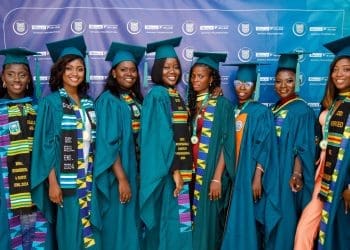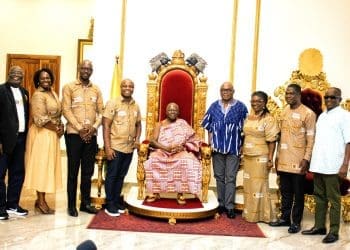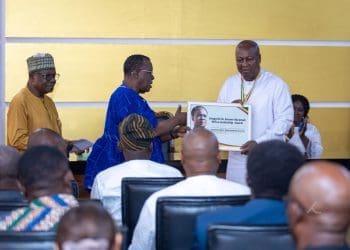Tremendous progress was recorded in advancing digital literacy in Ghana when about 100 students from the Mampong-Akuapem Demonstration School for the Deaf received training in essential digital skills during a visit by The Coding Caravan.
The initiative, which focuses on equipping young people with foundational skills in information technology, made its latest stop at the special needs school, offering hands-on lessons to boost digital inclusion and empowerment.
The Coding Caravan made its first stop of the year at the Mampong-Akuapem Demonstration School for the Deaf, delivering hands-on coding lessons to approximately 100 students and 25 staff members.
The Coding Caravan is a digital skills awareness programme of the Coding Education for Ghana Initiative.
Members of the caravan, drawn from the Institute of ICT Professionals Ghana (IIPGH), began the session by training teachers on Scratch, a foundational visual programming language designed to introduce learners to the basics of coding.
They then engaged the students in practical sessions using Arduino—an open-source electronic platform that enables users to build interactive projects.

The team also introduced participants to the Internet of Things (IoT), explaining how interconnected devices communicate and function, with mobile phones serving as the primary interface for interaction.
Finally, they were also taught about 3D design and printing.
Regulatory and Research Manager at the Ghana Chamber of Telecommunications, organisers of the Coding Caravan, Louis Bobbie Osei, said in an interview that the initiative was committed to promoting inclusive education across the country.
He explained that the Coding Caravan aligns with the government’s 1 Million Coders initiative, aimed at equipping young people with relevant digital skills for the future.
Mr. Osei noted that the decision to visit the special school was deliberate. “We believe that outside of the able-bodied students, the special students deserve to have this knowledge brought to them,” he stated.
He noted that it would be counterproductive to have digital services being brought into the country by the Chamber’s members, if the citizens have no clue how to interact with them.”
He stated, “It is important to bridge the digital divide and enhance digital literacy by supporting programmes such as this.”
Bobbie Osei was particularly impressed with the enthusiasm shown by the students and their quick grasp of the concepts that were taught to them.
He called for more support from corporate entities to enable the Coding Caravan to bring its knowledge to more children around the country.
Kweku Frempong, Chief Executive Officer of Helios Towers Limited, a telecom tower infrastructure company, who sponsored the caravan, called on other corporate entities to come on board and help take the caravan to more places.
He explained that Helios believes in the Ministry of Communications’ digitisation agenda.
He noted that although it is good to focus on digitisation for people who are able to code properly, it is more impactful to carry along the marginalised and oft-deprived.

He noted that the programme is the first of many such collaborations between the Chamber and Helios to bring ICT education to the most deprived and far-flung communities.
Frempong was hopeful that this initiative would help bridge the opportunity gap that these often-shunned students would face.
Director of Administration at the IIPGH, Gifty Mottey-Gowu, said that the day’s event “marks a bold statement that disability is not inability.”t
She revealed that the IIPGH plans to partner with government agencies and local education authorities, and development partners to expand the scope of the Coding Caravan, “so that no child will be left behind.”
She called on private sector places to support the IIPGH to procure more computers, 3D printing devices, among others, so that they could equip the schools to enable them to continue with the programme after the Caravan has passed through.
Mrs Mottey-Gowu expressed her elation with the enthusiastic demeanour of the students, describing the programme as “extremely fulfilling.”
The headmaster of the Mampong–Akuapem Demonstration School for the Deaf, Setumtee Ametewee, was grateful to Helios and the Telecoms Chamber for including his students in the digitisation agenda.
He was hopeful that the knowledge shared with them would open doors of opportunity for the students in the world of ICT.
He said, “Many of the children come from humble backgrounds and might not be able to afford a laptop, but with this, even developing that interest in computers alone, is enough.”














